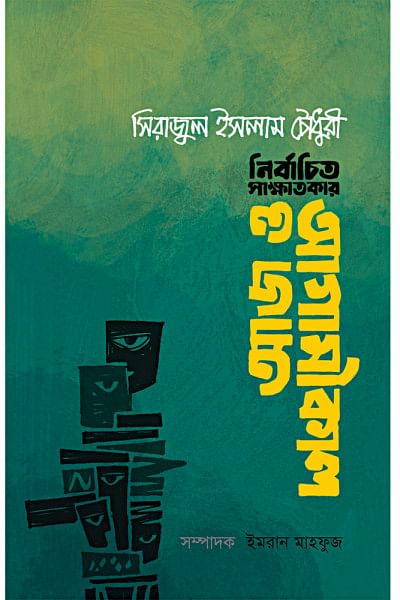An intellectual at his finest

Aaj O Agamikaal: Nirbachito Shakkhatkar (Daily Star Books, 2020) by Professor Serajul Islam Choudhury and edited by Emran Mahfuz, a young poet and writer, comprises a selection of interviews given by Professor Chowdhury in his long career as an academic, writer and a strong voice of social justice and democracy. With 21 interviews, Aaj O Agamikaal is rich with insight on democracy, education, freedom of speech, the Liberation War, and literature and culture. The book starts with an interview with Keshab Mukhopadhyay and ends with reflections on the quota movement.
Since the merciless killing of Bangabandhu, different governments have ripped off the constitution, subsequently letting opportunism and bigotry seep into politics and people's mindsets. Since then disparities have grown in society, in the education system, and hostile relationships exist among political parties; as a result, discrimination abounds in every sector. Choudhury believes that Bengalis have a long legacy of living together peacefully, but the issue of religious and communal conflicts—the latter of which spawned upon the arrival of the British—has gone unaddressed on an institutional level. Consequently, the country has seen a rise in fanaticism and hooliganism. If the three main sectors—executive, legislative, and judiciary—do not work properly, if people do not see hope in economic development and equal distribution of wealth, the disadvantaged will take recourse to criminal activities. The country will be doomed to turmoil.
Asked about his thoughts on death, Choudhury points out, "Everyone has to leave this world, but creative people never die. To keep the dead alive, the living should live on" (translation mine). There is deep philosophy in this remark. He further articulates, "Humans are called the best creation, but actually they are selfish beings." For even an insignificant gain, a person does not refrain from killing another, and in a capitalist society, the number of the selfish only multiplies. There is no denying our two opposite virtues: animalism and empathy.
What Choudhury predominantly stands against are capitalism, fundamentalism, social injustice and violation of human rights. Over and over, he emphasises that only socialism can ensure emancipation of human beings from subjugation and inequality. He stresses on the separation of religion from politics and the state. In this respect, writers, poets and artists can play a vital role to inspire people to think outside the box. Great writers pose a challenge to the existing state apparatuses, whereas minuscule ones lick statesmen's boots, hoping to earn favour. Following the flow of the current, no one can create great literature. And yet, intellectuals have started becoming mouthpieces for political parties.
The meaning of life, to Professor Chowdhury, is to live well and such a life has three elements: creativity, a sense of right and wrong, and self-respect. He places conscience above courage. At this stage of life, he is happy, but not content, because many of the dreams that the people saw during the Liberation War are yet to materialise.
The book Aaj O Agamikaal: certainly inspires a reader to look back and forward, as the writer covers almost everything that a conscious person may need to build his country anew. Among manifold issues, he reflects on educational institutions, Shakespeare, Bacon, Tagore, Nazrul, Jibanananda Das, European revolutions, the two world wars, gender discrimination and more. There is weight and insight in his words. Except for some typos, the book is well presented, and lucidity of prose sets the seal on a smooth read. It is no doubt a valuable document for Bengali readers.
Mohammad Shafiqul Islam, author of Inner State (Daily Star Books, 2020), is Associate Professor, Department of English, Shahjalal University of Science and Technology, Sylhet. Email: [email protected]
The book is available on Rokomari and at Bookworm Bangladesh, Friends Book Corner, New Market and Bookends, Unimart.

 For all latest news, follow The Daily Star's Google News channel.
For all latest news, follow The Daily Star's Google News channel. 



Comments